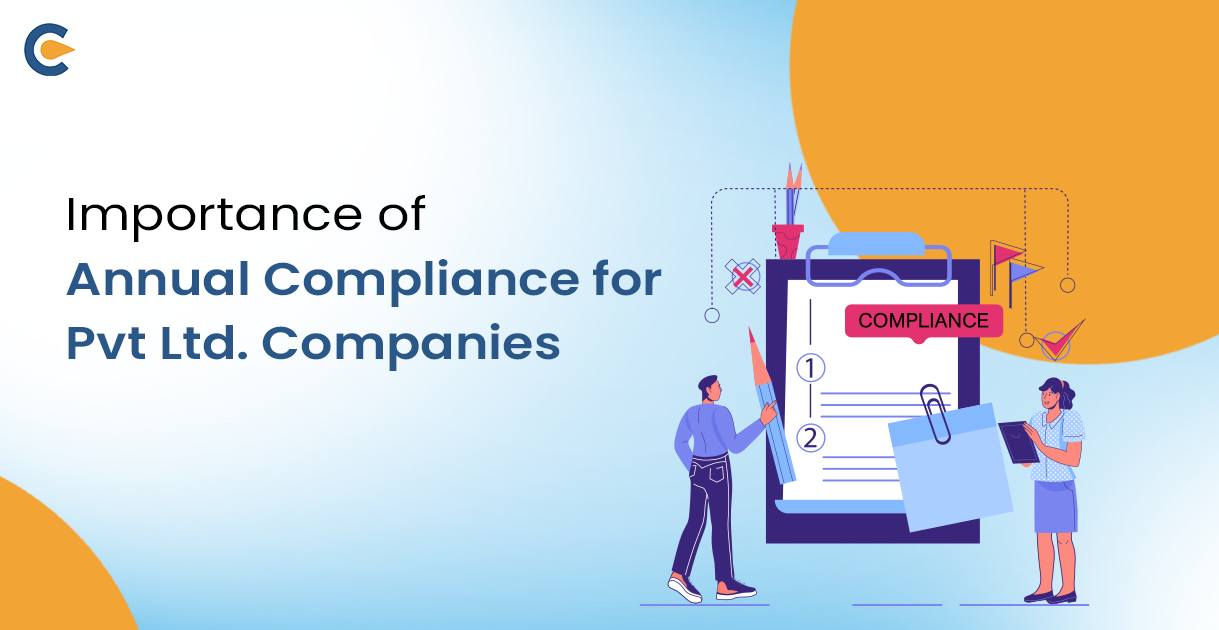The Companies Act of 2013 controls all the Private Limited Companies formed in India, outlining a thorough set of requirements to maintain openness and responsibility in company activities. The importance of annual compliance for Pvt Ltd. companies is listed below –
Statement of Finances
A statement of finances is a very important part of the company transaction, and the report of the finances needs to be sent to the Ministry of Corporate Affairs. These statements include the company’s profit, total revenue, assets, liabilities, debts, equity, etc, and these documents are needed for annual compliance for Pvt Ltd. Companies. For the annual publishing of statements, three more components need to be in the annual statements which are –
- For annual compliance for Pvt Ltd. companies, a P&L statement or statement of income needs to be provided with the annual returns of the company along with the net profit, net sales, revenue, and any expenses or losses incurred.
- The company’s balance sheet, which includes the company’s assets, debts, liabilities, and equities for that financial year, has to be filed at the MCA.
- The cash flow of the company also needs to be shown in the records. It includes the money received in the bank plus whatever expenses the company has made during the financial year.
These statements publishing can help the company as well. A private company requires funds at sometime in the course of business in order to run its business. In these scenarios, any creditor or investor will look in the company’s books of accounts before investing in them.
These statements of finances need to be submitted within six months from the end of the previous financial year. The statements provided to the MCA should be true and accurate, and that is why the companies hire chartered accountants to provide such reports.
The company’s financial statements should be filed with the registrar within 30 days of the company’s Annual General Meeting. These statements cannot be filed by an ordinary individual of the company and require experts to make reports, which generally is the chartered accountant. The financial statements need to be filed with the ROC, or else there can be penalties levied on the company, which vary from the delay to the number of days.
Tax Returns
Any individual or a company needs to pay taxes and file an Income Tax Return (ITR) to the government, mentioning their income in the financial year along with the taxes paid and claimed deductions in that year to maintain income tax compliance. For a company, income tax compliance is necessary, and filing an ITR doesn’t mean that the company has attained profits in that financial year; even if a company has suffered heavy losses, an ITR has to be filed. Failing to do so will impose greater penalties and payment of interest on that.
Income Tax Returns need to be filed within the prescribed time frame. ITR of the Financial year 2023-2024 can be filed by 31st October 2024. Apart from this, the government sometimes extends the deadline in some circumstances, which should be looked at while following the Income Tax Compliances.
Annual General Meeting (AGM)
According to the Companies Act 2013, every company has to hold annual general meetings with the shareholders of the company to meet the annual compliance requirements for Pvt Ltd. Companies. In this meeting, agendas are discussed, and the financial statements of the company are discussed with the shareholders so that operational or managerial steps are taken. Section 96 of the Companies Act,2013 states that within nine months of the end of the first financial year of the company, it has to hold an annual general meeting to discuss the annual compliance for Pvt Ltd. Companies.
During the Annual General Meeting, shareholders can ask questions, express concerns, and vote on the company’s numerous proposals, such as the election of directors, appointment of auditors, and approval of dividend payments. The AGM also allows shareholders to communicate with the company’s management and offer input on its performance.
In a scenario where a company misses its AGM within the prescribed time limit, there are strict penalties levied on the company for not recognizing the importance of annual compliance for Pvt Ltd. Companies. Fine includes up to rupees one lakh for the company and rupees one lakh for the directors of the company in case of any default. Hence, not meeting the annual compliance for Pvt Ltd. Companies can prove to be very harmful to both the company and its directors.
Appointment of an Auditor
According to the Companies Act 2013, the Board of Directors appoints the first auditor of a business within 30 days of its establishment. Following that, the firm must nominate an auditor at each Annual General Meeting (AGM) who will serve from the end of that meeting until the following AGM as a part of annual compliance for Pvt Ltd. companies. If a corporation fails to nominate an auditor during its Annual General Meeting, the present auditor will serve until a new auditor is appointed in the meeting. If the present auditor declines to be an auditor further, the firm needs to inform the Registrar of Companies (ROC) within seven days. The ROC is required to select a new auditor in such a case.
The company has to file Form ADT-1 after the auditor’s appointment in the 15 days following the annual general meeting. This form is required to tell the appointment of an auditor in the company. The financial reports, income tax compliance, and auditor’s reports should be filed to meet the annual compliance requirements for Pvt Ltd. Companies.
If the company fails to file Form ADT-1, then the company, along with the officers at default, will be liable to pay a fine of a minimum of rupees ten thousand, which can extend up to rupees one lakh. Companies can face greater fines if the required Annual Compliance for Pvt Ltd. is not met.
Annual Returns
The company needs to file the annual returns in Form MGT-7, and it has to be done within sixty days of the conclusion of the Annual General Meeting. Whatever the important documents are, like books of accounts, financial statements, income tax compliance, etc., they should be filed with the registrar of the company to avoid any late fee or penalty.
DIR-3 KYC
Every year, all directors are obliged to file Form DIR-3 KYC with the Ministry of Corporate Affairs, which contains information such as their name, proof of address, PAN, Aadhaar number, and cellphone number as a part of annual compliance for Pvt Ltd. Companies. This file should be completed before the due date, which is usually 30th April of the applicable fiscal year. Failure to file or late submission of DIN KYC might result in penalties and perhaps the deactivation of the director’s DIN until a prescribed late fee of rupees five thousand is paid.
Form DIR-3 KYC is filled out when the director has never provided the details before to the registrar, or there is any need to change the provided details. A DIR-3 KYC web form is filled when these details are already provided by the directors with no changes required. Before 30th September of the financial year, this form should be filed with the registrar for the preceding fiscal year.
Conclusion
Annual Compliance for Pvt Ltd. Companies is very important for the companies registered in India under the Companies Act, 2013. Compliance of Private Limited Companies is regulated by the MCA in the country, which follows the guidelines set by them, so in no case should one fail to follow the regulations formulated. The penalties are hefty and strict, including fines on directors as well, so the right documents and reports should be sent to the registrar within the due date.
Corpbiz can help individuals file these documents with the registrar on time as a part of annual compliance for Pvt Ltd. Companies. It helps to ease the process and get the required reports and documents to the MCA within the due date.
Frequently Asked Questions
- Is there any form to file financial statements?
Yes, to file a company's financial statements, one needs to fill out Form AOC-4 within 30 days of the commencement of the AGM. The form is also required to file the reports of the company directors.
- To whom are the forms for filing annual returns submitted?
The forms for compliance of Private Limited Companies are submitted to the registrar of companies regulated by the Ministry of Corporate Affairs.
- What is the use of form MGT-7?
Form MGT-7 is used to file the company's annual returns along with the register of members within sixty days of the AGM.
- What are important forms to fill out to meet annual compliance requirements for Pvt Ltd. Companies?
The important forms to fill out to meet annual Compliance for Pvt Ltd. Companies are Form MGT-7 for annual returns, AOC-4 for financial statements, and reports of directors of the company.
- Who pays the penalty for failing to hold the Annual General Meeting?
On failing to hold the Annual General Meeting, both the company and directors may be held liable to pay a fine of up to rupees one lakh.
- What is the period for filing annual returns of the company?
The annual returns have to be filed with the registrar of companies within sixty days of the conclusion of the Annual General Meeting.
- For how long can a company appoint an auditor?
The company can appoint an auditor either for five consecutive years or till the end of the next AGM.
- How can I file my company's annual returns?
Companies formed under the Companies Act of 1956 are obliged to file annual returns with the ROC. All corporations must file the company balance sheet in Form 23ACA and a profit and loss statement in Form 23ACA.
- Is there any form required to be attached to the company director's report?
Yes, Form MGT-9 has to be attached to the company's director's report, which is the crux of Form MGT-7.
- Why is Annual Compliance for Pvt Ltd. Companies needed?
The primary goal of Annual Compliance for Pvt Ltd. Companies is to follow the internal policies and processes, as well as regulatory regulations set by the authorities. Implementing these compliance processes preserves the reputation of the company, helps enhance its vision and value, and also avoids rule violations.
Read Our Article: Mandatory Annual Compliances For One Person Company











